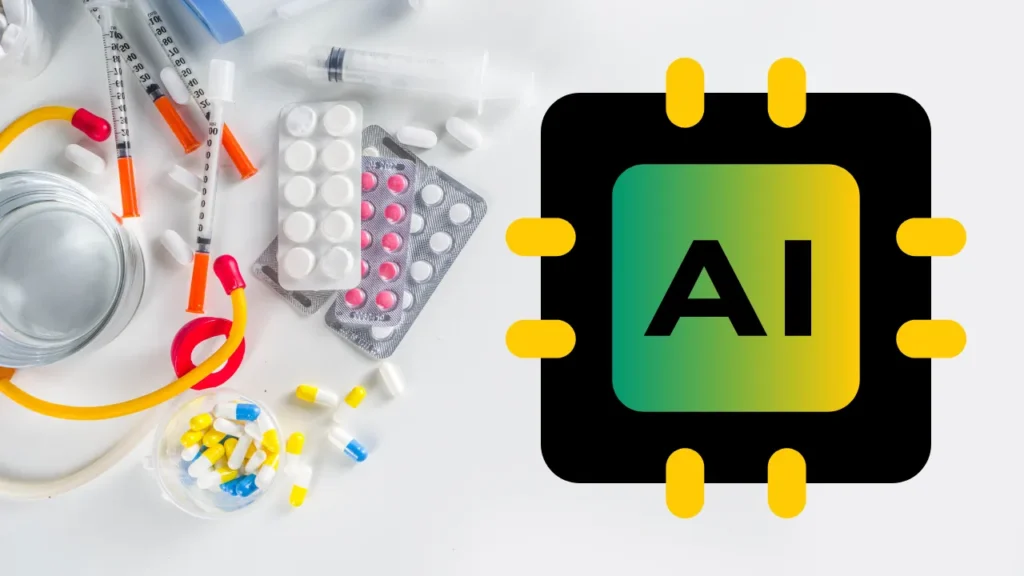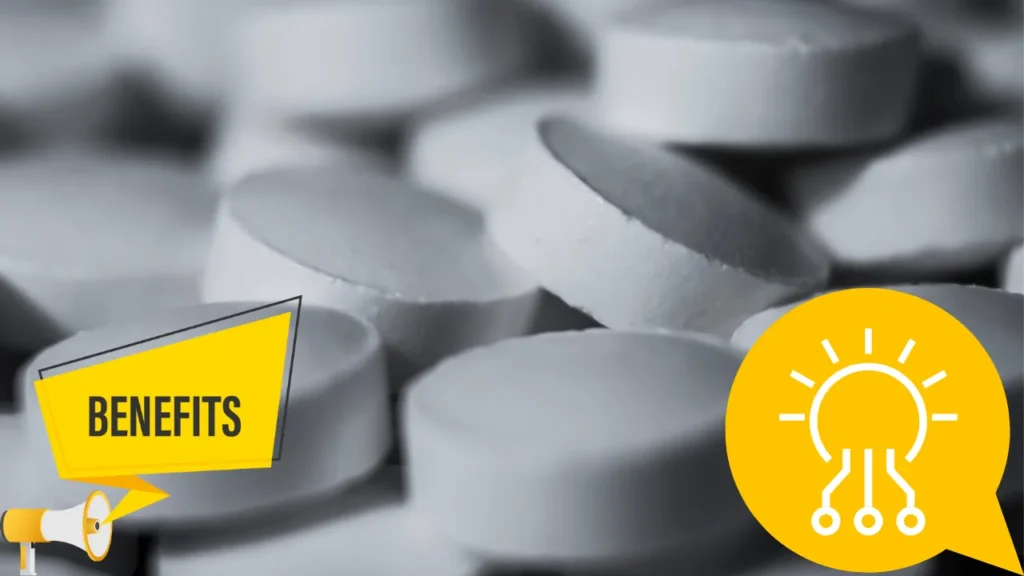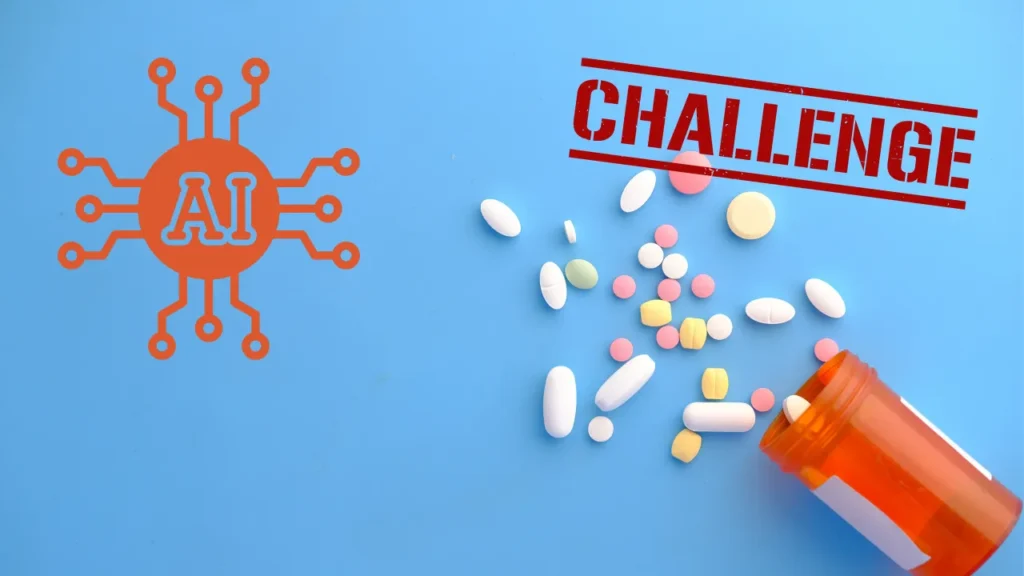Generative AI in pharma industry promises innovation, speed, & savings.
Can AI truly revolutionize drug discovery and patient care?
With its potential to cut costs, speed up research, and improve precision, AI is changing in the pharmaceutical world. AI-driven models are transforming how drugs are discovered, developed, and tested.
Companies such as Pfizer and Moderna use AI to accelerate vaccine research, while AI-driven programs optimize clinical trials and personalize treatments. Experts predict billions in cost savings and reduced time-to-market for life-saving medications.
However, how precisely is AI changing the pharmaceutical industry?
What difficulties does it encounter?
Allow us to examine the revolutionary developments and possible obstacles influencing Generative AI in the pharma industry moving forward.
To avoid AI detection, use Undetectable AI. It can do it in a single click.
Table of Contents
An Overview of Generative AI in Pharma

The Boston Consulting Group has found over 130 possible applications of generative AI in pharma industry, from digital sales agents and automated medical text generation to patient identification using information from medical records. The business cites five golden use cases in particular as the promising:
- A quarter less time is being spent on production as an effect of quicker drug molecular design.
- Rapid clinical development can reduce writing time by up to 30%, in particular when it comes to automating the creation of medical documents.
- By supplementing routine tasks, improved quality management could see performance improvements of 20–30%.
- Improved content production, customization, and adaptation can save external agency expenses by over 25 percent and boost revenue by 10%.
- Productivity gains of up to 40% are possible in high-frequency tasks.
Although generative AI has enormous theoretical potential, its practical applications are particularly significant. Pharma companies are seeing observable findings:
- With a 38% success rate in molecular docking predictions, DiffDock outperformed deep learning techniques (20%) and conventional techniques (23%).
- Using artificial intelligence, Insilico Medicine created a drug candidate in one-third the time and at one-tenth the cost of conventional techniques.
- With a remarkable 79% accuracy rate, this Insilico Medicine program has forecasted clinical trial effects.
- By using AI to predict targets for 36 billion compounds, Recursion predicted targets for 36 billion compounds using artificial intelligence (AI), enabling a scale of research in a week that might have used 100,000 years using traditional techniques.
Use Cases of Generative AI in Pharma

Quick and Effective Drug Development and Discovery
The application of generative AI to the development of new drugs is causing a major upheaval in the pharmaceutical sector. A drug requires an average of 12 to 18 years to reach the market, and it costs $2.6 billion. Furthermore, just over ten percent of applicants reach the trial stage, indicating a low success rate.
AI is changing conventional processes and improving the speed and efficacy of the creation of new medications. When it comes to finding possible drug candidates, Gen AI is revolutionary. It is used to develop novel molecular structures that target particular illnesses.
Artificial Intelligence (AI) speeds up the commonly drawn-out drug discovery process by producing molecules that have been designed for efficacy and safety. New medications that target diseases that were previously incurable become possible by this technology. AI helps refine the structure of a promising drug candidate once it has been identified.
This procedure, identified as lead optimization, modifies the molecular structure to improve the characteristics of the medication. AI-generated compounds are synthesized and tested to improve their pharmacological properties. Higher safety and effectiveness in potential treatments is achieved by this technique.
AI is also extremely significant when it comes to drug reuse. It entails altering medications to address various ailments. Due to AI it is possible to investigate novel therapeutic possibilities for currently available drugs by producing molecules that resemble popular medications but have different characteristics.
Large volumes of data from ongoing drug development tests are handled by pharmaceutical companies. This becomes easier by generative AI, which automates trial tracking. It improves efficiency and record-keeping by generating succinct reports and summaries.
These AI-generated documents provide instant access to key data, facilitating informed choices. Beyond just creating molecules, artificial intelligence is also transforming drug development and virtual screening processes.
AI prioritizes compounds with desired biological activity by predicting their binding affinities. Particularly for complex disorders, this technique accelerates the discovery process.
- With Pharma.AI, its Gen AI platform, Insilico Medicine has achieved a noteworthy milestone. Patients are now participating in Phase II clinical trials for their AI-generated medication, INS018_055. It is intended to treat the uncommon and crippling lung condition referred to as idiopathic pulmonary fibrosis.
In contrast to the customary 12 to 18 years, the transition to Phase II took about three years. The effectiveness and promise of AI in drug development are demonstrated by this example.
- Adaptyv Bio’s artificial intelligence and synthetic biology platform is advancing protein engineering. By fusing modern robotics and microfluidics, the technology causes it possible to validate AI-based protein designs effectively.
Their creative technique is necessary for creating sustainable materials and novel medications.
- Using cryo-EM, Iktos and Curreio collaborate on projects to develop AI-driven drugs. Accelerating the development of innovative preclinical drug candidates is the objective of their collaboration.
By using cryo-EM for in-depth structural analysis and AI to find molecules that fulfill multiple key criteria, they hope to improve the drug discovery process.
Improved Clinical Research
AI finds the right patient types by examining Electronic Medical Records (EMR). By concentrating on those who are probable to respond to treatments, this targeted approach increases trial success rates. AI can also be used in research design. It reduces the size of control groups by simulating placebo cohorts with digital twins.
AI also simplifies the massive amounts of data that are handled during tests, which helps with study planning and expedites the consent procedure. AI models are necessary for predicting the effects of therapy in predictive analytics. They could accelerate the preclinical stage and lessen the necessity for animal testing.
Driven by AI post-trial text summarization resources examine vast amounts of data to extract key insights. This highlights Gen AI’s significant influence on clinical trial efficiency by accelerating analysis and assisting in strategic decisions.
Virtual assistants (VAs) and chatbots for pharma are improving market research and strategy in the pharmaceutical sector. These programs provide real-time tracking of sector dynamics, product launches, trial updates, and competitor monitoring.
Thus, through constant monitoring, generative AI in chatbots helps businesses stay current and arrive at prompt and informed decisions. AI systems also evaluate the portfolios of major players, analyze financial data, and direct strategic planning.
They offer information on technology adoptions, investment trends, and the top priorities for drug development. By using these resources, companies can efficiently plan their marketing plans, R&D rights, and international expansion initiatives, promising they maintain their competitive edge in a market that is changing quickly.
Using Virtual Assistants to Improve Pharmaceutical Research and Development
The way researchers monitor and oversee trials is being transformed by generative driven by AI VAs. Real-time trial updates, including enrollment figures and significant milestones, are provided by these assistants. On the basis of past data, they also produce succinct summaries of trial progress and recommend subsequent actions.
Clinicians can maximize the findings of trials while executing informed decisions with the aid of this feature. In the field of intelligent chemical and material searches, virtual assistants assist in identifying and assessing appropriate compounds and suggest materials that comply with predetermined standards.
In order to identify possible analogs and forecast the characteristics of novel compounds, VAs conduct structural similarity inquiries. This technique expedites the initial phases of drug development and discovery. Furthermore, by automating intricate queries and experiment tracking, these programs improve R&D efficiency.
They are able to generate thorough summaries, identify important insights, and provide efficacy assessments. This degree of automation accelerates pharmaceutical innovations through careful record-keeping. Sanofi has improved clinical research design and expedited its drug discovery process by using AI and data science.
Furthermore, the company increased probable target identification by 20% to 30% in neurology, oncology, and immunology. The selection time for lipid nanoparticles was shortened from months to just a few days by incorporating artificial intelligence into mRNA research.
Furthermore, to improve trial site setup and increase enrollment of underrepresented populations, Sanofi is implementing Gen AI in its clinical operations.
Improving Personalized Medicine and Disease Identification
The ability of generative AI to analyze large data sets is revolutionizing the identification of disorders and diagnoses. It is better than humans at spotting trends, irregularities, and connections. This lowers the errors caused by clinicians leading to quicker and accurate diagnoses.
Read Also >>> Generative AI for Sales in 2025
AI is a potent support application, but it cannot replace the doctors. This assistance could democratize healthcare and increase access to high-quality care on a worldwide scale. Personalized medicine is also at the forefront of artificial intelligence. The technique tailors care according to a patient’s unique genetic profile and other variables.
Gen AI algorithms create medications tailored to particular patient populations. This customization can reduce side effects and increase treatment efficacy. AI raises the bar for drug design precision by creating molecules that are tailored to each patient’s specific requirements.
Increasing Pharmaceutical Sales and Marketing
Generative AI creates extremely tailored content for pharmaceutical commerce. Generative AI creates educational materials and marketing campaigns for patients and healthcare professionals. Generative AI generates multiple text versions for A/B testing.
Generative AI identifies the effective messages for target audiences, and optimizes business strategies.
For instance, Gen AI can write detailed descriptions of a drug’s mechanism or pieces explaining treatment benefits. In addition, Gen AI extends to various channels and crafts visual elements to increase audience engagement and boost sales.
Driven by AI healthcare applications also provide detailed analysis of physicians’ answers. They obtain information from feedback forms, surveys, and CRM systems. Thus, it is possible for pharmaceutical companies to customize their communication strategies while being confident they meet the requirements of their customers.
Consequently, new technology improves patient care decisions.
Modernizing Manufacturing and Supply Chain Procedures
Generative AI is extremely adept at analyzing historical sales data, market trends, and environmental factors. Accurate demand forecasts for medications are produced by this analysis, providing continuous supply and reducing waste. Such a strategy is necessary for striking a balance between cost-effectiveness and efficiency.
AI significantly enhances efficiency in manufacturing. It aligns equipment use with material availability to optimize production schedules. Due to this idle time is reduced and use of resources is increased. A continuous and effective drug creation cycle depends on such scheduling precision.
Furthermore, by recommending modifications to the order of production steps to increase output and efficiency, Gen AI pinpoints areas that require improvement.
A further significant aspect of pharmaceutical manufacturing, precision in medicine composition, is preserved by artificial intelligence.
It promises consistent dosing by carrying out intricate computations for precise drug structure and potency. This technology helps to maintain guidelines and maintains quality standards by automating monitoring and compliance tasks. Generative AI is being used effectively by Sanofi in its supply chain and manufacturing processes.
The business has improved accuracy and efficacy by digitizing quality assessment. The company has been able to maximize its yield through technological integration, which has resulted in effective use of raw materials.
Notably, Sanofi is now able to predict 80% of low inventory positions with accuracy due to the use of AI. It significantly improves the efficiency and dependability of the supply chain.
Knowledge Delivery Transformation
Through the simplification of complex R&D data, Gen AI improves healthcare provider (HCP) training. Clinical professionals can understand complex drug information due to this technology. It distills major findings from copious R&D facts and presents succinct and understandable summaries.
In addition, it produces visual aids to help explain complex ideas and translates technical scientific terms into understandable language. HCPs remain up to date on the recent advancements in medication due to these AI-driven programs. Medical staff improve their decisions and improve patient care.
Patients can better access and comprehend medical information due to artificial intelligence. It increases awareness of antibiotic resistance, streamlines medication regimens, and elucidates possible adverse effects. AI provides information in a way that is simple to understand and tailored to each patient’s unique requirements.
Individualized educational resources equip people with necessary medical information. Therefore, they can use generative AI to manage their health and lend themselves to informed choices about treatment and lifestyle changes. Pharmaceutical companies’ internal training processes are being revolutionized by generative AI.
It adapts training programs for new hires according to skill evaluations. AI develops R&D and manufacturing process-specific programs that address quality control, equipment operation, and drug formulation. AI also creates interactive modules, videos, and documents effortlessly.
Without the dangers of the real world, captivating simulations offer a useful comprehension of intricate processes. Adaptive strategies improve continuous learning. AI provides real-time feedback by recommending training materials based on an individual’s performance.
The R&D process modeling for new employees is an example of this technique, which aids in their rapid understanding of the stages of medicine development. AI-generated manuals explain how to set up, operate, and maintain equipment for employees in manufacturing.
Using advanced models, these video tutorials show how to handle hazardous materials and uphold hygienic standards in cleanrooms while adhering to legal requirements.
Strengthening Safety and Quality Management
Gen AI is necessary in the pharmaceutical industry for assessing the effectiveness of medications and their lack of side effects. Large volumes of clinical data are swiftly and precisely analyzed, revealing possible safety concerns. This aids in determining the efficacy of a medication.
AI also keeps an eye on the quality of medications as they are created. In this manner, technology promises that medications adhere to rules and meet uniform standards. Therefore, patients find their medications safer and beneficial, which increases public confidence in pharmaceutical products.
Benefits of Using Generative AI in Pharma

By reducing years of research into months, Gen AI transforms drug discovery. New treatments become possible by the technology at previously unheard-of speeds. We could consider some benefits it offers to boost the industry:
- AI provides key safety data by enabling ongoing monitoring of medication side effects. In addition to improving patient security and guiding major modifications in medication formulations and usage guidelines, it enables prompt reaction to adverse events.
- AI streamlines the creation and submission of documentation pertaining to compliance. This promises compliance with strict regulatory standards, minimizes human error, and saves time. Consequently, the technology accelerates the approval process for drugs.
- The distribution and use of resources in the drug-creation mechanism are optimized by artificial intelligence. Therefore, resources and manpower are used effectively, concentrating on the promising research directions.
- AI provides in-depth understanding of the complex world of pharmaceutical intellectual property. This information optimizes the drug development process, protects intellectual property, and directs strategic choices.
- Gen AI finds novel therapeutic applications for current medications. This provides patients additional options for therapy quickly in addition to prolonging the shelf life of medications.
- By anticipating equipment failures, AI enables prompt interventions. The technique lowers expenses from unplanned malfunctions, maintains production efficiency, and minimizes downtime.
- The technology quickly extracts key insights from vast biomedical sources. This promotes creative research and development by improving our understanding of illnesses and therapies.
Challenges of Using Generative AI in Pharma

AI implementation is a delicate balancing act that involves complex privacy concerns and moral conundrums. The following issues have to be resolved for the company’s ROI and reputation:
- An enormous obstacle is the strict setting of the industry guidelines. Pharma businesses have to deal with complicated regulations, which often require for changes to LLMs and procedures.
- Protecting private patient and research data is a necessity when using generative AI in the pharmaceutical industry. To avoid breaches, the technology has to adhere to stringent guidelines that include access control, encryption, and safe data management techniques.
- Significant financial resources and specific expertise are required to introduce Gen AI. In addition to the cost, integrating AI systems with current workflows and infrastructures is a challenge.
- Because of incomplete or skewed datasets, artificial intelligence may contain biases or inaccuracies. To improve these LLMs’ accuracy and dependability, it is necessary to continuously refine them using a variety of high-quality data.
- The complex algorithms of Gen AI can be difficult to understand, which undermines stakeholder acceptance and trust. For AI-driven decisions to be widely adopted and trusted, strategies to demystify its reasoning processes have to be developed.
- The systems require regular maintenance and updates in order to remain current and functional. This requires frequent data refreshes, algorithm modifications, and keeping up with emerging trends.
- Pharmacies have to keep up with the quickly changing technological landscape. This requires constant funding for R&D, employee education, and adjusting to new AI capabilities.
FAQs: Generative AI in Pharma
What is Generative AI and how is it being used in the pharmaceutical industry?
Generative AI, often referred to as Gen AI, is a subset of artificial intelligence that focuses on creating new content, insights, or answers based on existing data. In the pharmaceutical industry, Generative AI is being used in various ways, particularly in drug discovery and drug development.
By using AI algorithms and complex AI models, pharmaceutical companies can analyze vast datasets to identify potential drug candidates. This not only accelerates the drug discovery process but also improves the accuracy of predictions regarding the efficacy and safety of new drugs.
What are some promising use cases of Generative AI in pharma?
There are several noteworthy use cases of generative ai in pharma. For instance, Generative AI can optimize the drug development process by simulating various molecular interactions, thereby accelerating drug discovery.
In addition, AI programs can be used for personalized medicine, where treatments are tailored to individual genetic profiles. Generative chemistry is another application, enabling researchers to generate novel compounds that could lead to new drugs.
According to McKinsey, these applications have the potential to significantly reduce time and costs associated with bringing new drugs to market.
How does AI in the pharmaceutical industry promise innovation?
AI in the pharmaceutical industry is heralding a new era of innovation by streamlining processes and improving research capabilities. For example, AI can help in predicting patient outcomes through data analysis, improving clinical trial designs, and even identifying new therapeutic targets.
The potential of generative AI to analyze complex datasets enables researchers to uncover insights that were previously hidden, leading to innovative approaches in pharmaceutical research and development. As pharmaceutical companies embrace these technologies, we can expect a wave of innovative drugs and therapies to emerge.
Conclusion: Generative AI in Pharma
With its innovative approaches that improve clinical trials, accelerate drug discovery, and streamline manufacturing procedures, generative AI is completely changing the pharmaceutical sector.
Pharma companies may significantly reduce expenses, boost productivity, and expedite the release of life-saving therapies by using AI-driven insights. For truly responsible AI implementation, however, issues such as data security, ethical considerations, and regulatory compliance should be cautiously handled.
In what ways do you think artificial intelligence could alter the pharmaceutical sector over the next ten years?
Share your thoughts in the comments below!


